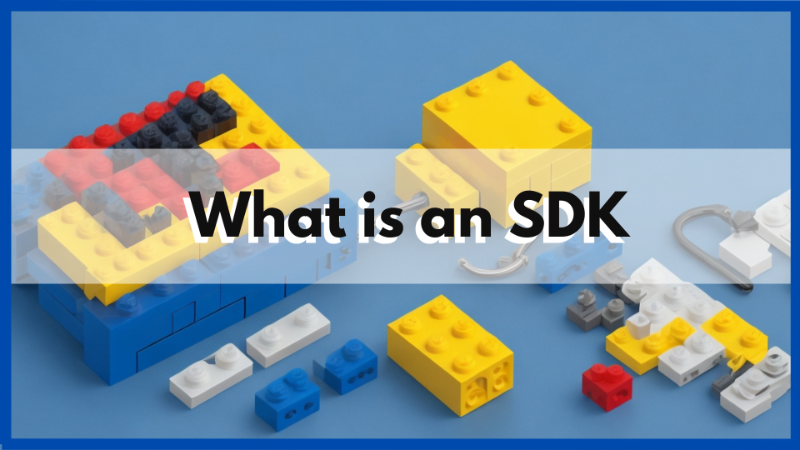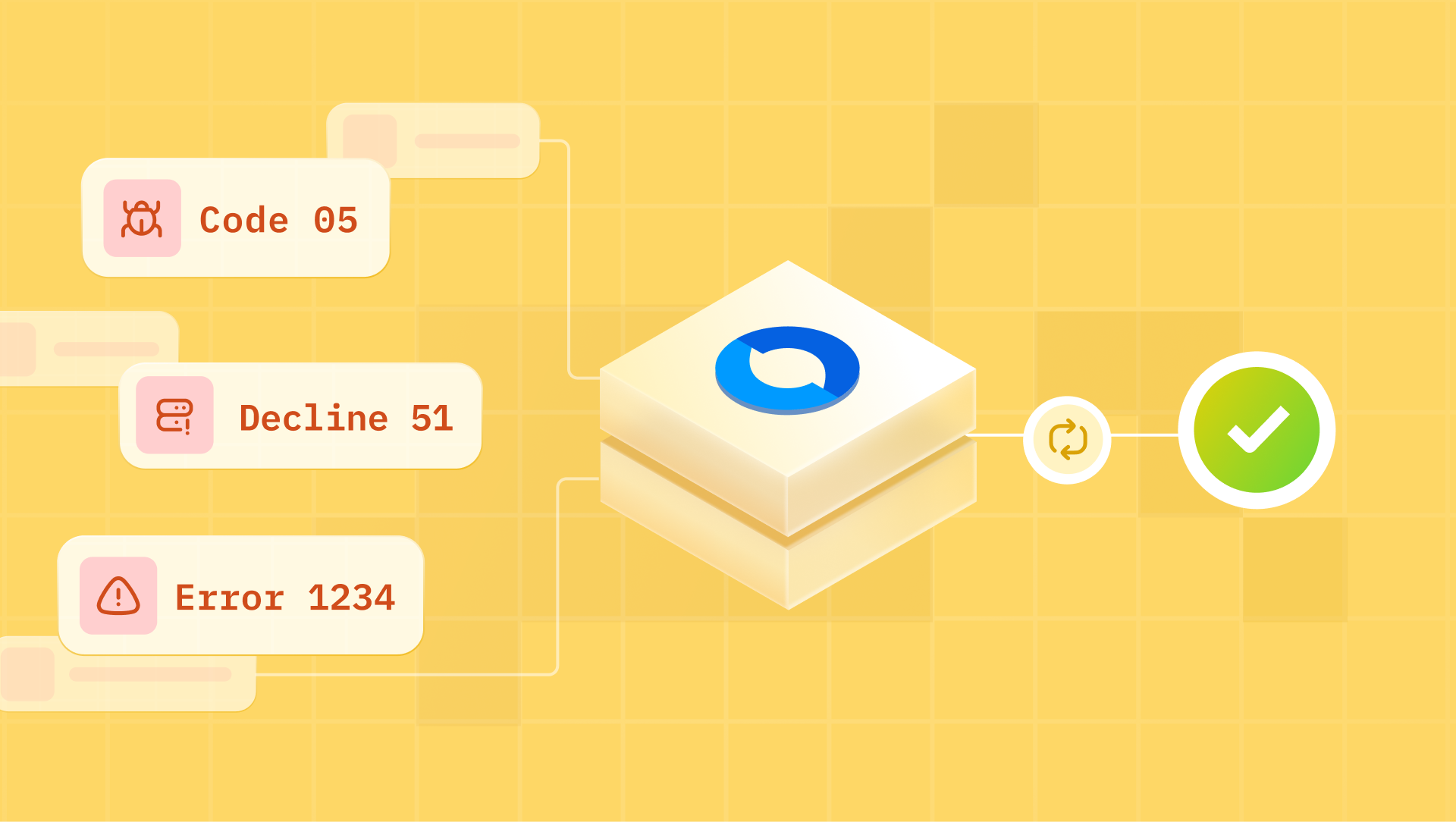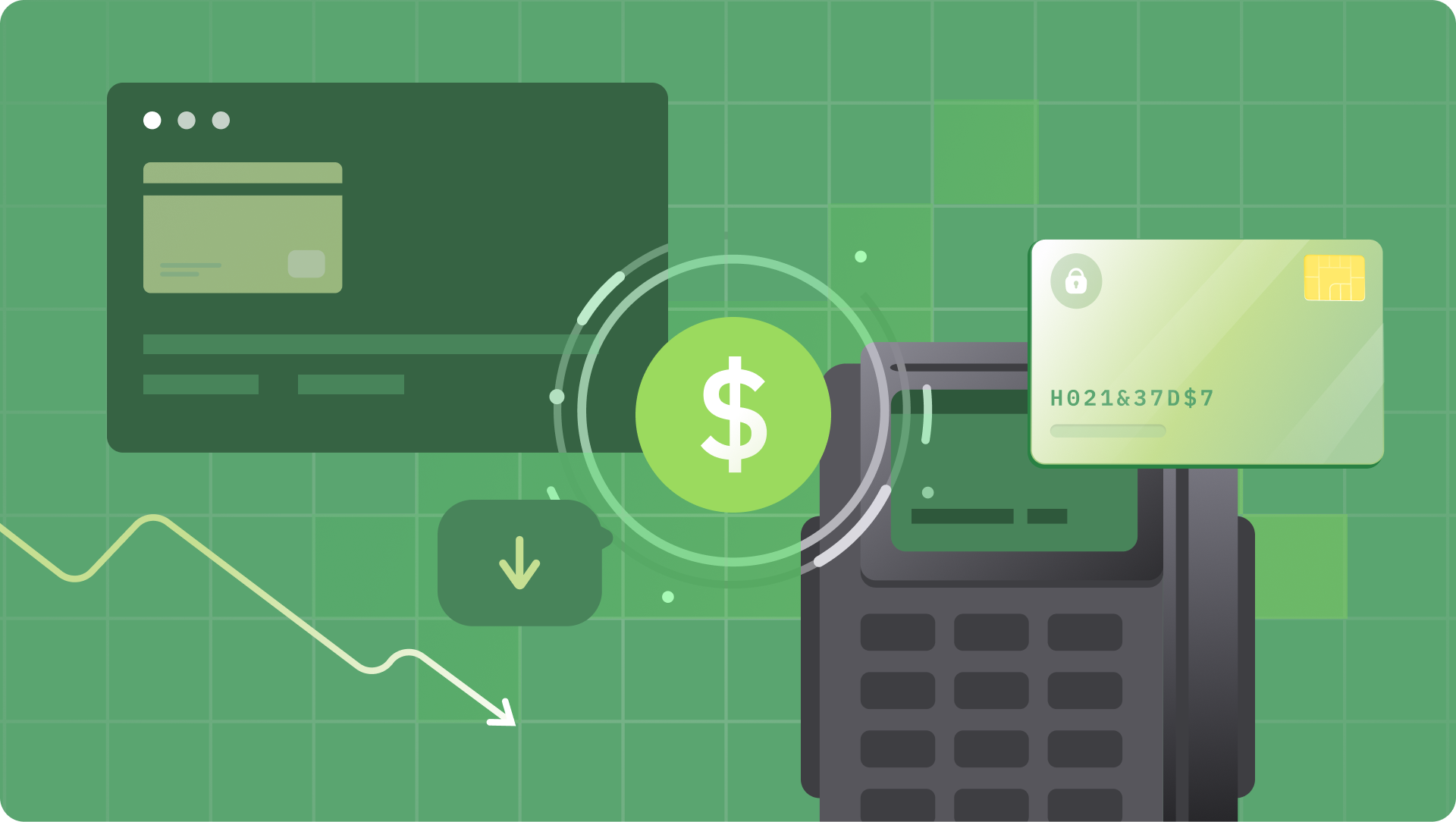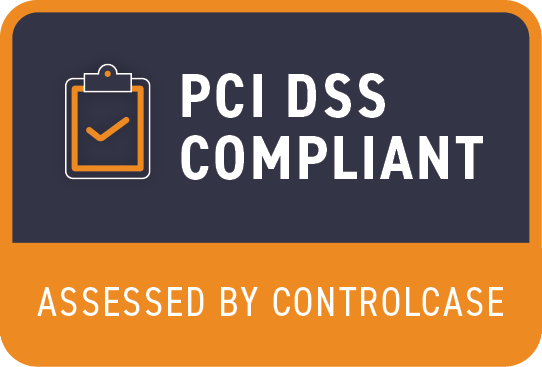Ever wondered how your favorite apps and software come to life? Well, they don't just magically appear. Behind the scenes, there's a crucial player in the game – something called an SDK, or Software Development Kit.
If you are into software development, you've likely come across the term "SDK" at some point. But what exactly is an SDK, and why is it an integral part of modern software development? In this comprehensive guide, we'll demystify SDKs, explore their significance, and dive into the differences between SDKs and APIs. We'll also discuss the challenges and considerations that come with using SDKs. So, whether you're a seasoned developer or just getting started, let's unravel the world of Software Development Kits (SDKs).
What exactly is an SDK?
An SDK is a comprehensive package of software tools, libraries, documentation, and resources that equips developers with everything they need to build applications for a specific platform, framework, or service.
The Components of an SDK-
A typical SDK comprises several key components:
- Tools: These are software programs that assist developers in various stages of the development process. Tools can include code editors, debugging tools, and testing frameworks. They make the developer's job more efficient and productive.
- Compilers and interpreters: These convert code written in a programming language into machine-readable code. Compilers generate executable programs, while interpreters directly run programs.
- Profilers: Profilers analyze application performance, including memory usage, execution times, and code execution paths. By collecting and analyzing data, profilers help identify areas of a program where optimizations can be made or where issues could happen.
- Libraries: SDKs often include pre-written code libraries that provide common functionalities, such as user interface components or data processing functions. These libraries save developers from reinventing the wheel and speed up the development process.
- APIs (Application Programming Interfaces): APIs are a crucial part of many SDKs. They define the rules and protocols for how different software components can interact with each other. By using APIs, developers can integrate external services and functionalities seamlessly into their applications.
- Integrated development environment (IDE): An IDE brings together essential tools developers use to write and test software and debug code. An IDE typically includes a code editor, a compiler, a debugger, a project manager, and a version control system.
It additionally includes
- Documentation: Comprehensive documentation is a hallmark of a good SDK. It offers detailed explanations, guides, and examples on how to use the SDK's tools and libraries effectively. This documentation is an invaluable resource for developers looking to harness the full potential of an SDK.
- Sample Code: Many SDKs come with sample code or templates that serve as starting points for developers. These code snippets demonstrate how to implement specific features or functionalities, allowing developers to build upon them.
Why use SDKs?
The use of Software Development Kits has become increasingly prevalent in the software development landscape. But what drives developers to incorporate SDKs into their projects? Let's explore the compelling reasons behind the popularity of SDKs.
Efficiency and Time-Saving:
One of the primary motivations for using SDKs is their ability to expedite the development process. SDKs typically contain pre-built components, libraries, and tools that simplify complex tasks. This can save developers a substantial amount of time and effort, allowing them to focus on the core functionality of their software.
Consistency and Reliability:
SDKs are designed and maintained by experts in their respective fields. This means that you can rely on the SDK to perform its functions consistently and reliably. Whether you're integrating payment gateways, incorporating AI algorithms, or implementing a mapping feature, using an SDK ensures that you're working with well-tested and dependable code.
Access to Advanced Features:
Many SDKs provide access to advanced features and functionalities that would otherwise require extensive development efforts. For example, mobile app developers can harness the power of a camera SDK to access device-specific camera features and capabilities, resulting in feature-rich applications.
Cross-Platform Compatibility:
SDKs are often designed to be cross-platform, which means they can be used across different operating systems and devices. This versatility is invaluable for developers looking to reach a broad audience without having to write platform-specific code.
Community and Support:
SDKs often come with dedicated developer communities and support channels. This means that if you encounter issues or have questions while using an SDK, you can tap into a network of experts and fellow developers for guidance and assistance.
What makes SDKs different from APIs?
Now that we understand the advantages of using SDKs, let's delve into the distinction between SDKs and APIs. While both are crucial tools in the developer's arsenal, they serve different purposes and offer unique benefits.
API (Application Programming Interface):
APIs act as intermediaries, allowing different software applications to communicate with each other. They define a set of rules and protocols that enable one application to request and receive data or services from another. APIs are like bridges that facilitate data exchange between systems.
SDK (Software Development Kit):
On the other hand, SDKs are comprehensive packages that include libraries, tools, and documentation to aid developers in building applications for a specific platform or service. SDKs are more extensive than APIs and often contain pre-built components that simplify the development process.
Key Differences:
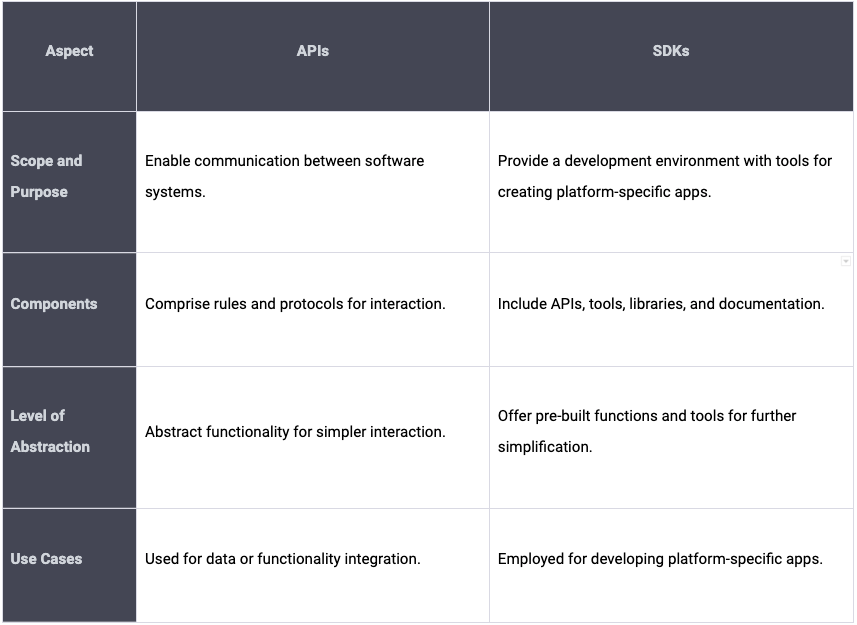
Challenges and Considerations with SDKs
While SDKs offer numerous benefits, they are not without their challenges and considerations. Let's explore some of the common issues developers may encounter when working with SDKs.
Integration Complexity: Integrating an SDK into your project can sometimes be a complex task, especially when dealing with multiple SDKs simultaneously. Ensuring that all SDKs work seamlessly together can be a daunting challenge.
Size and Performance:
SDKs can significantly increase the size of your application, affecting download times and storage requirements for users. Additionally, poorly optimized SDKs can impact the overall performance of your software.
Maintenance and Updates:
SDKs are not static; they require regular updates to stay compatible with evolving platforms and technologies. Keeping track of updates and ensuring that your application remains up-to-date can be time-consuming.
Dependency Risks: Relying heavily on third-party SDKs can create a dependency risk. If the SDK provider discontinues support or makes significant changes, your application may face compatibility issues.
Privacy and Security:
When integrating third-party SDKs, developers need to be cautious about data privacy and security. Some SDKs may collect user data, and improper handling of this information can lead to privacy breaches.
FAQ:
- Are SDKs only used in mobile app development?
No, SDKs are used in various domains, including web development, IoT, and game development. They provide valuable tools and resources for building software across different platforms. - How do I choose the right SDK for my project?
Choosing the right SDK depends on your project's requirements and goals. Consider factors such as efficiency, platform compatibility, community support, and the specific features offered by the SDK.
Today, Software Development Kits (SDKs) play a pivotal role in simplifying complex tasks, improving efficiency, and enabling access to advanced features. While they share similarities with Application Programming Interfaces (APIs), SDKs provide a more comprehensive development environment, making them invaluable tools for developers across various domains.
Despite the challenges and considerations associated with SDKs, their benefits far outweigh the drawbacks when used thoughtfully and strategically. As technology continues to evolve, SDKs will remain a key resource for building innovative and feature-rich software applications. So, whether you're creating a mobile app, developing for the web, or exploring new frontiers in software development, understanding and harnessing the power of SDKs can greatly enhance your capabilities and accelerate your projects. Happy integrating!

